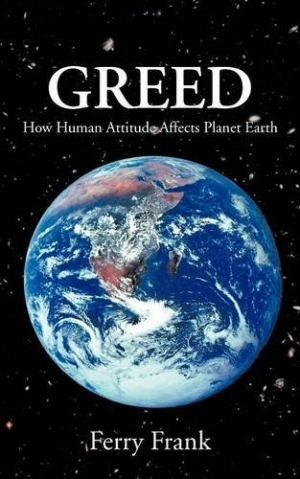Greed
How Human Attitude Affects Planet Earth
“From thermodynamics we know of the strive for maximum entropy (S) of all matter. In short, matter has to spread out and dissipate into the universe…When the Lord, at the end of the sixth day, created Adam and Eve, He told them to spread out over the world and multiply.” From this intriguing beginning, the author of Greed, Ferry Frank (in real life, Cor Hilak), builds a portrait of life on earth that includes history, sociology, religion, and politics and returns often to the theme of greed as a prime human motivator and destroyer.
In the planet-scape that Frank projects, mankind has been pushed and pulled by greed—land hunger, gold hunger, dominance hunger—since its earliest days. About as soon as humans were “civilized” they set out to conquer other people. A clever wordsmith at times, Frank suggests that the northern European countries that subjugated the peoples of South America, Africa, and the Far East “would be called terrorist states today.” Frank leaves no one out of his condemnation: ancient Greece, that long-admired cradle of democratic governance, did not allow women or slaves to vote. And it was not until the mid or late twentieth century that modern, progressive nations gave universal franchise to all citizens.
Frank points out that the urge to dominance is common to everyone but particularly to males; he cleverly calls it the disease of “MAids” (Male Inciting Dominance Syndrome). He aptly suggests that the year 2000 ushered in the age of “too” (rather than “two”): “everybody wanted everything to be too big…too much.” He refers to this as “Version 2.0.”
In the right setting, Frank could be a teacher, course designer, or inspirational speaker. In this volume, however, there are two main problems. The first is simply the language itself. Perhaps the author used a translating machine or relied upon what would seem to be his own imperfect grasp of English. Some examples include the use of the word “strive” in the quotation found in the opening paragraph of this review, referring to people of a certain “believe,” and using the phrase “unspeakable of.” Such mistakes are common throughout the book.
The second problem, a deeper one, is that, despite the promise of the book’s early chapters, the author rants but does not fully develop and complete his thesis. Readers are not given a guideline for preventing greed or assisting entropy in the universe, nor even a sense of which would be the right course of the two. This, combined with the weakness of the language, will leave readers puzzled. While the ideas presented are individually sound and many points are well made, there is no conclusion, no takeaway.
At the very end of Greed, there is a single page exhortation to use Twitter and Facebook to spread the small phrase, “Put your heating already one degree lower?” Unfortunately, this is hardly enough to inspire a movement.
Reviewed by
Barbara Bamberger Scott
Disclosure: This article is not an endorsement, but a review. The publisher of this book provided free copies of the book and paid a small fee to have their book reviewed by a professional reviewer. Foreword Reviews and Clarion Reviews make no guarantee that the publisher will receive a positive review. Foreword Magazine, Inc. is disclosing this in accordance with the Federal Trade Commission’s 16 CFR, Part 255.

